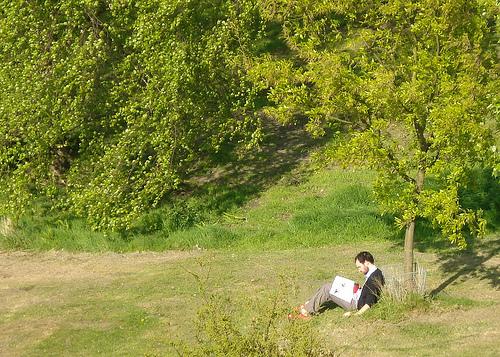Dear Students,
In an innocuous office complex, three blocks south of Northwestern University, and a short walk from Lake Michigan, you can find the Yellowbrick psychiatric treatment center. Though Yellowbrick treats the expected spectrum of mental disorders, from anxiety to schizophrenia, its mission is unique: it’s the country’s only psychiatric center dedicated exclusively to emerging adults — young people in the ever-expanding gap between adolescence and the stability of family, a mortgage, and a settled career.
Unfortunately for you, my dear student reader, business at Yellowbrick is booming.
In a recent New York Times Magazine article, journalist Robin Marantz Henig provides a haunting portrait of a typical Yellowbrick patient: he’s a young man “who had done well at a top Ivy League college until the last class of the last semester of his last year, when he finished his final paper and could not bring himself to turn it in.” This brief moment of existential despair spiraled out of control.
“The demands of imminent independence can worsen mental-health problems or create new ones for people who have managed up to that point to perform all the expected roles,” explains Henig. “[They] get lost when schooling ends and expected roles disappear.”
In other words, when you go through life thinking “if I can make it through this, things will be better later,” you eventually forget what “better” means.
This doesn’t mean that every student who sees school as a trial to survive will end up at Yellowbrick, but the despair that accompanies the perpetual postponement of an enjoyable life has a way of making its presence known. It is seen, for example, in the regular e-mails I receive from college students suffering from deep procrastination — an advanced stage of burnout where, as with the Yellowbrick patient mentioned above, completing work becomes impossible — or the quiet desperation of the overworked law associate who strains to remember why, exactly, law school had once evinced such certainty.
I didn’t write this letter to chastise. In fact, I’m dismayed by the growing number of (often Ivy League educated) voices in the student stress debate who cry out “there’s more to life than Harvard!”, but provide little guidance to what such a life should entail.
I write instead to suggest an alternative.
I spent the last decade researching and writing books about students who defied the survival mindset. These are students who did well academically — they got into good colleges, and went on to interesting jobs — but did so while enjoying their lives.
At the core of their strategies were three simple rules, which, with your indulgence, I want to share with you now:
Do Less.
These students revel in an open schedule and the ability to dedicate more than enough time to a reasonable course load and a small number of activities. They recognize the deep satisfaction in an unhurried afternoon spent grappling with an AP Literature assignment under a shade tree.
Do Better.
Along with the time affluence granted by doing less comes an obligation to do the small number things they do much better. These students recognize that they’ll ultimately be judged not by the sum of their contributions to diverse activities, but instead by the magnitude of their ability in the one thing they do best. For them, however, it’s about more than the aura of stardom that shines from someone with true ability, there’s another deep satisfaction to be found in the craftsmanship of slowly building skill, a thin layer at a time.
Know Why.
These students practice the above rules not as a means but as an end: A life with both freedom and focus is a life well-lived. In the short term, this approach will help you get into a good college and then excel once there, but its effectiveness lasts well beyond. Consider, for a moment, someone whose life you admire as being capital-G Good — perhaps, for example, a respected writer or profound thinker — you’ll likely note that they, like these students, dedicate their time to a small number of pursuits (perhaps just one), but do those small number of things exceptionally well.
Three simple rules; six short words: it’s a compact philosophy, but its impact is great.
It explains how Michael got accepted to Stanford with a weekday routine that included a two hour, head-clearing hike, and how Sarah got into Princeton with a schedule that allowed her to finish her schoolwork before dinner.
It also explains how Alice, who had to withdraw from college for a semester due to poor performance, ended up becoming an A student an honored as one of the top tutors on campus after drastically reducing her course schedule, and how Scott became a stand out at his law school after eschewing the activities new students were expect to take on.
Emerson famously noted that “for nonconformity the world whips you with its displeasure. And therefore a man must know how to estimate a sour face.” He then continued, crucially, by adding: “but the sour faces of the multitude…have no deep cause, but put on and off as the wind blows.”
People express strong feelings about their expectations for the modern academic experience, and to many you might encounter, the idea of doing less will prove simply inconceivable, and perhaps even offensive. But as you start your fall semester, keep Emerson’s wisdom close, and remember that these strong feelings have no deep support and are likely of little real consequence.
Put another way, forget that overworked junior, stage-managed by his $900-an-hour college counselor, and ignore that triple-major who proudly broadcasts his growing tally of all-nighters: it’s your life and your right to invest abundant mental energy in figuring out how to live it well. Hopefully the ideas presented here will give you a good place to start.
All the Best,
Cal Newport
The MIT Campus
Cambridge, Massachusetts
















